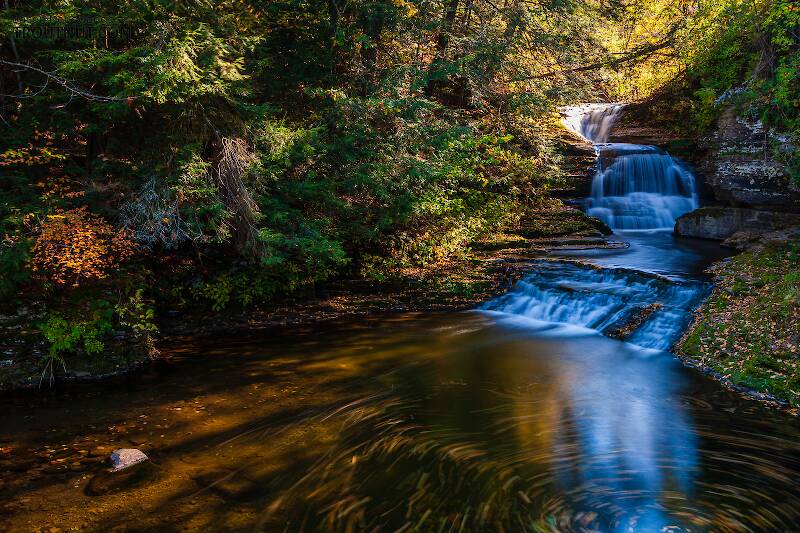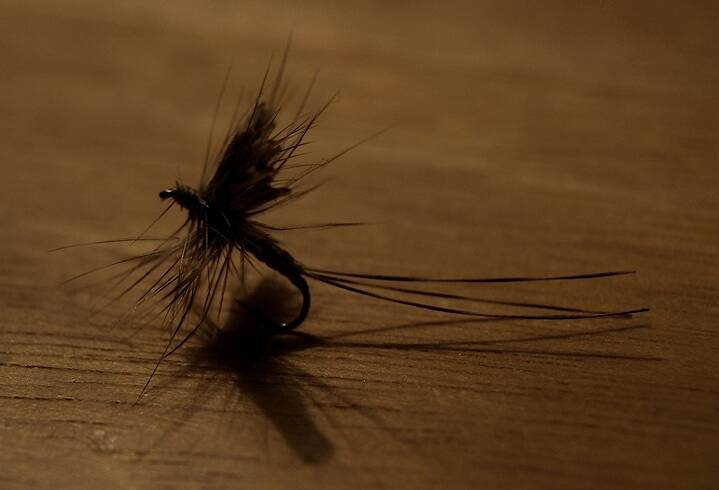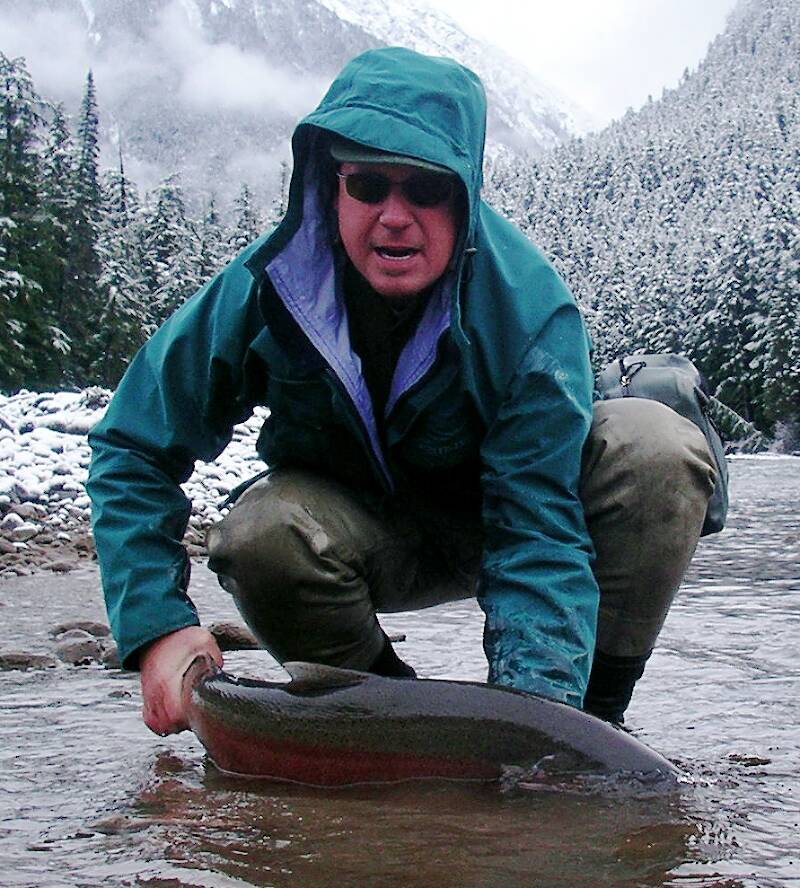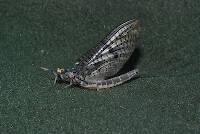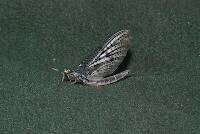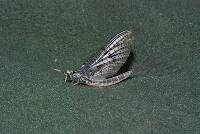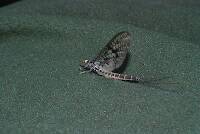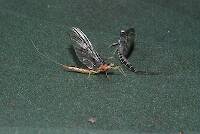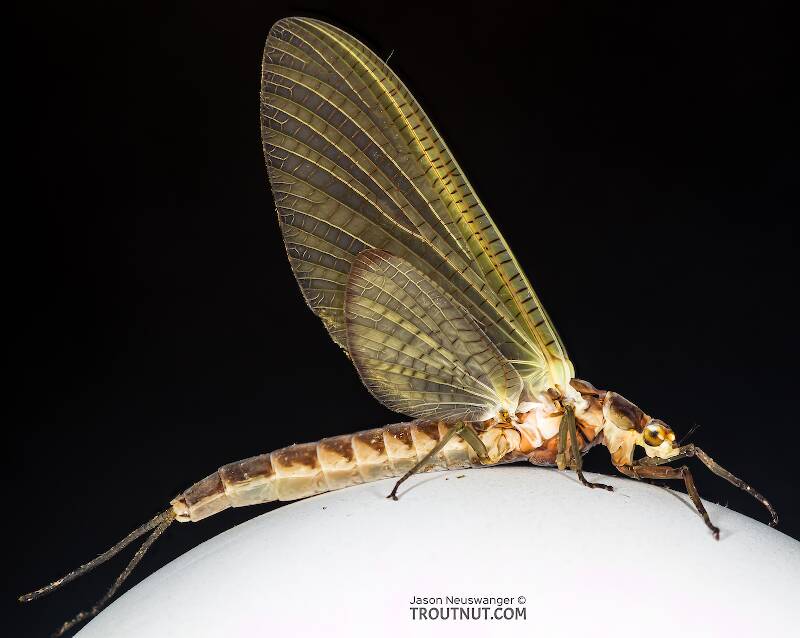
Hex Mayflies
Hexagenia limbata
The famous nocturnal Hex hatch of the Midwest (and a few other lucky locations) stirs to the surface mythically large brown trout that only touch streamers for the rest of the year.
Featured on the forum
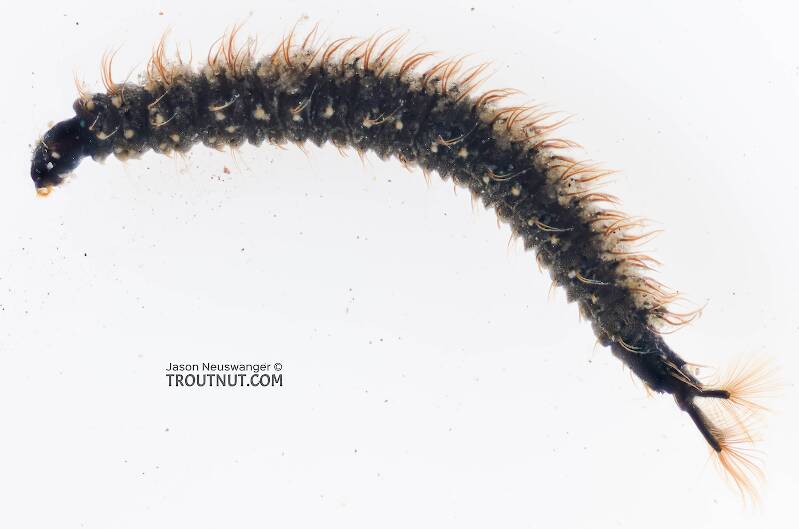
This wild-looking little thing completely puzzled me. At first I was thinking beetle or month larva, until I got a look at the pictures on the computer screen. I made a couple of incorrect guesses before entomologist Greg Courtney pointed me in the right direction with Psychodidae. He suggested a possible genus of Thornburghiella, but could not rule out some other members of the tribe Pericomini.

Troutnut is a project started in 2003 by salmonid ecologist Jason "Troutnut" Neuswanger to help anglers and
fly tyers unabashedly embrace the entomological side of the sport. Learn more about Troutnut or
support the project for an enhanced experience here.
FisherOfMen on Mar 24, 2012March 24th, 2012, 4:28 pm EDT
Hey guys, I'm homeschooled and my mom assigned this project:
I have to present 1/2 dozen+ framed flies as an art project for this homeschool talent show.
First, I'm not really comfortable with my tying yet, so I don't want to show off anything already, but its a requirement,so...
I need some advice! -What species are easy to imitate? I need labeled pictures of what species the fly is imitating as well, I can probably get those right here on troutnut!
Also, what flies do you think will look "cool" to the average passer-by? I can tie some effective patterns, but would rather tie some "pretty" patterns for this "show-and-tell" ordeal. I got a book from the library and I'm going to work on extended hair bodies for some good looking mayflies.
I have to present 1/2 dozen+ framed flies as an art project for this homeschool talent show.
First, I'm not really comfortable with my tying yet, so I don't want to show off anything already, but its a requirement,so...
I need some advice! -What species are easy to imitate? I need labeled pictures of what species the fly is imitating as well, I can probably get those right here on troutnut!
Also, what flies do you think will look "cool" to the average passer-by? I can tie some effective patterns, but would rather tie some "pretty" patterns for this "show-and-tell" ordeal. I got a book from the library and I'm going to work on extended hair bodies for some good looking mayflies.
"Nothing makes a fish bigger than almost being caught." -Author Unknown
All that is necessary for the triumph of evil is that good men do nothing. -Edmund Burke
All that is necessary for the triumph of evil is that good men do nothing. -Edmund Burke
Troutnut on Mar 24, 2012March 24th, 2012, 5:15 pm EDT
I think you're on the right track with extended mayfly bodies. Those always have an elegant look. Maybe try some cut wings on them, too.
Classic salmon flies are always eye-catchers, but they can be tricky to tie and require materials you wouldn't have at a beginner's tying bench.
Cased caddisflies could be good to imitate, too. And beetles are pretty easy. Trying for realistic antennae, legs, and tails might be good for artistic purposes, although they're not always so important to the fish. You might also consider printing out small photos (you can use the ones from this site if you like) of the bugs your flies imitate, and showing the real thing next to the imitation. I think that would make it more impressive to anyone viewing it who doesn't know what the real insects look like in the first place.
Classic salmon flies are always eye-catchers, but they can be tricky to tie and require materials you wouldn't have at a beginner's tying bench.
Cased caddisflies could be good to imitate, too. And beetles are pretty easy. Trying for realistic antennae, legs, and tails might be good for artistic purposes, although they're not always so important to the fish. You might also consider printing out small photos (you can use the ones from this site if you like) of the bugs your flies imitate, and showing the real thing next to the imitation. I think that would make it more impressive to anyone viewing it who doesn't know what the real insects look like in the first place.
Jason Neuswanger, Ph.D.
Troutnut and salmonid ecologist
Troutnut and salmonid ecologist
FisherOfMen on Mar 24, 2012March 24th, 2012, 6:15 pm EDT
Thanks Jason-
I just finished an Adams-ish dry with an extended body. It looks alright I guess, but the extended body is a little sloppy from uneven thread wrapping. Practice should take care of that, I thought it was pretty good for a first!
I think I have a plan now - I've printed out life cycle diagrams for mayflies and caddisflies, and I'm going to tie one fly for every life cycle of both.
What is cut-wing?
I just finished an Adams-ish dry with an extended body. It looks alright I guess, but the extended body is a little sloppy from uneven thread wrapping. Practice should take care of that, I thought it was pretty good for a first!
I think I have a plan now - I've printed out life cycle diagrams for mayflies and caddisflies, and I'm going to tie one fly for every life cycle of both.
What is cut-wing?
"Nothing makes a fish bigger than almost being caught." -Author Unknown
All that is necessary for the triumph of evil is that good men do nothing. -Edmund Burke
All that is necessary for the triumph of evil is that good men do nothing. -Edmund Burke
Troutnut on Mar 25, 2012March 25th, 2012, 11:29 pm EDT
Jason Neuswanger, Ph.D.
Troutnut and salmonid ecologist
Troutnut and salmonid ecologist
Entoman on Mar 26, 2012March 26th, 2012, 9:09 am EDT
Nick -
Since it is an art/talent competition that I assume will be judged by non-fishers, I would advise a little less emphasis on the science and a little more on the visuals. Perhaps some larger flies with more color? Streamers perhaps? I think Jason was on the right track with the Salmonfly idea. You could tie them simplified. Go buy a pack of size 4 or larger salmon hooks (they are up-eyed and black finished) and have fun whipping a bunch up, all with squirrel tail wings. Just vary the hackle/tail/floss body with different bright colors. You don't need to add fur thoraxes, tags, and such - just simple tinsel ribs on a floss body. You could also tie some with white or black bucktail if you want to vary the wings too.
Purple Peril (var.) #1/0

Material list:
Hook - TMC 7999
Thread- black 6/0 Uni
Tag - silver flat tinsel
Tail - purple pheasant tippet
Rib - small silver oval tinsel
Body - purple floss
Thorax - violet seal fur
Hackle - folded purple hen
Wing - Grizzly (Red or Fox squirrel opt.)
Since it is an art/talent competition that I assume will be judged by non-fishers, I would advise a little less emphasis on the science and a little more on the visuals. Perhaps some larger flies with more color? Streamers perhaps? I think Jason was on the right track with the Salmonfly idea. You could tie them simplified. Go buy a pack of size 4 or larger salmon hooks (they are up-eyed and black finished) and have fun whipping a bunch up, all with squirrel tail wings. Just vary the hackle/tail/floss body with different bright colors. You don't need to add fur thoraxes, tags, and such - just simple tinsel ribs on a floss body. You could also tie some with white or black bucktail if you want to vary the wings too.
Purple Peril (var.) #1/0

Material list:
Hook - TMC 7999
Thread- black 6/0 Uni
Tag - silver flat tinsel
Tail - purple pheasant tippet
Rib - small silver oval tinsel
Body - purple floss
Thorax - violet seal fur
Hackle - folded purple hen
Wing - Grizzly (Red or Fox squirrel opt.)
"It's not that I find fishing so important, it's just that I find all other endeavors of Man equally unimportant... And not nearly as much fun!" Robert Traver, Anatomy of a Fisherman
Quick Reply
Related Discussions
Topic
Replies
Last Reply
13
Jun 29, 2011
by Softhackle
by Softhackle

